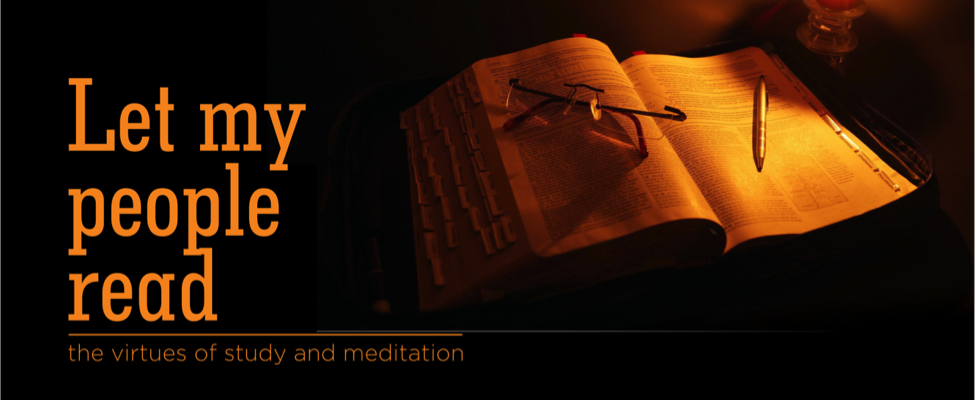After a lifetime of study and meditation, I have realized that sometimes it is better to stop seeking the answers, stop asking the questions. Just be.
-Jeffrey Small
The Effective Reading Culture
There has been a variety of campaigns around the country aimed at restoring reading as a high value in society. For years critics have lamented the low reading culture among Nigerians. Literary enjoyment has been supplanted by other leisurely pursuits and it is affecting performances in schools and ultimately, the quality of human capital available to the economy. President Jonathan has made it a priority of his administration to get Nigerians reading again and that is a laudable goal.
What remains to be said is how much the poor reading habit inhibits us as people of faith. The virtues of study and meditation, erstwhile hallmarks of the Christian life have virtually disappeared. Most Christians don’t study any more. This accounts for the mediocre standards of discipleship that many critics have highlighted and also a dangerously high level of biblical illiteracy. The pursuit of knowledge and wisdom is a high value in the Christian heritage. Yet today, modern Nigerian Christians are content to manage a second-hand or even third-hand faith retailed by pastors who have now become essentially intermediaries between God and the faithful.
The Protestant Reformation began essentially as an information revolution – a struggle to democratize access to the scriptures instead of having them reserved for interpretation by a priestly class. It was a struggle to rediscover and reaffirm the universal priesthood – the access of each individual to God – which Christ bequeathed to the church.
- The emphasis on the miraculous, the sensational and the spectacular has robbed us of the critical capacity to search the scriptures and encounter God personally.
It is also ironic that modern Christians are repudiating an essential part of their faith tradition by refusing to read. In so doing, they have paved way for the unscriptural excesses and outrages that contradict the gospel.
The problem lies partly in technological advancement and the waves of modernity now altering society, particularly in how we perceive and handle information. The pursuit of spiritual wisdom and knowledge is based on a persistent digging, hunger for truth and a diligent seeking for deeper understanding while the visual age is characterized by short attention spans
The allure of the visual age has crept into the church to create a new paradigm of church as spectacle. The emphasis on the miraculous, the sensational and the spectacular has robbed us of the critical capacity to search the scriptures and encounter God personally. As the apostle Paul exhorted his young protégé, Timothy, “Study to show yourself approved.” The necessary scholarly discipline of diligent study is alien to a generation perpetually searching for the next visual sensation.
The age of visual media has transformed the ways and means of processing and perceiving information. We face the challenge of being able to deploy these media and technology tools in the service of propagating the gospel. We must not respond like luddites, reviling technological advancements as an affront to our beliefs. If we do so, we will be no better than the fanatics of years gone by who in misguided zeal disposed of their television sets because they were considered unholy. We are not called to resist modernity but to shape it in the light of higher values, accurately defining its ethical boundaries. Therefore creative ways of doing the gospel and promoting its values using the internet and allied visual media have become necessary.
Yet even with these media and newer tools like the Kindle and the ipad, the fundamental efficacy of reading remains unimpeachable. Reading shapes our fluency of speech, our ability to articulate ideas and above all our capacity for critical thinking.
This is why we, as people of faith, must also embark upon our own campaign to bring back the book in our churches. We should return study and meditation to the centre of Christian life. And by study, I do not mean reading only the Bible, but a renewed appreciation for knowledge. Charles Spurgeon famously said that he prayed with a Bible in one hand and a newspaper in the other. By this he meant that the effective Christian is not only one who knows hundreds of memory verses but one who is informed.
Let us also promote the virtue of learning through reading in our children’s churches and youth fellowships. As parents we have a vital role to play. It’s time for us to cut down on the number of hours our kids spend in front of the TV. Stow away the DVDs, the X-boxes, Play Stations and other video games and get them interested in books by stocking a home library and being readers ourselves. This way we can teach them the disciplines and delights of meditation, study, reflection and contemplation; and give them invaluable tools that will make them more effective Christians in their generation.
*Dr. Tony Rapu is a Medical Doctor, a dedicated Dad and a Decisive thinker.
He tweets @drtonyrapu
